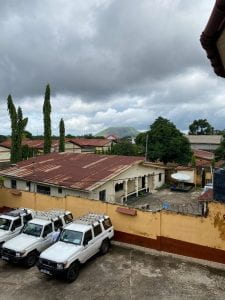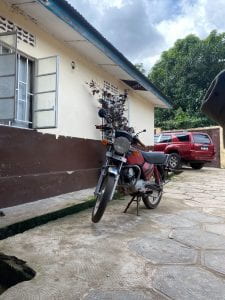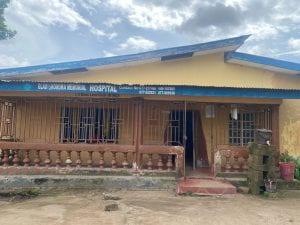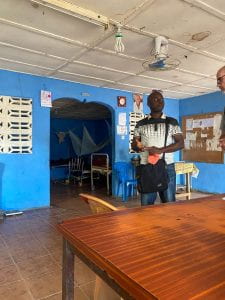Today was our second day in Sierra Leone, but we actually started our work today.
Our team has two subteams: operations for Ukweli and working on research for cervical cancer. We left our hotel at 9 AM and traveled to World Hope International where we began introductions and getting settled. Excitingly, this was our first time meeting in-person with several of our WHI colleagues that have worked with us on this project for several years.

Outside of World Hope International
We began the morning with a meeting with our distribution manager, Hassan, and we we were able to get a clearer picture as to how operations were working on the ground. From this conversation, it came to surface that there were some things that the team didn’t realize were occurring– for example, Hassan had expressed the reason for lack of sales of our product was that several community health workers were hesitant to sell and make profit to the women they are testing because it is not a good look for them within their community if they are proving false on the quote on quote free healthcare system. On the other hand, this shows that women going into the PHU are expecting the government-promoted free healthcare system. Therefore, this is leading to a decrease in demand as the economy is severely depressed and the advertised free healthcare system isn’t truly free of cost. This issue is something the team will have to work towards solving as a decrease in demand and a constant supply will cause damage to the goal of self-sustainability of Ukweli.
Additionally, we discovered that the actual screening wasn’t still occurring the way it was intended to be done. In the original operation system, women were getting tested both at PHUs and in the comfort of their own homes because community health workers used to go out into the communities. However, Hassan had informed us that due to lack of funding the workers no longer would travel into the communities and that usually one person, the lab technician, is usually screening the patients. This led to us realizing that one person is typically responsible for logging the data of the screening results.
The conversation then led into Hassan conveying his issues he was currently having with his motorbike that Ukweli currently provides. This issue is something we must work on to be resolved as this causes issues with the distribution of our boxes. To begin to resolve this issue, the group discussed how to proceed with WHI’s regional manager, Sharr. The regional manager was understanding, however, he had expressed that the decision of Hassan receiving a new motorbike was not his decision and it was up to another person to approve and talk to about the cost of the bike. Therefore, we will follow up with Sharr.

The standard motorbike that our distribution managers use on their onboarding process.
Afterwards, Hassan and a WHI driver drove Ukweli and two other teams to interact with PHUs. First, we went to Rescue International Hospital and we were able to introduce ourselves to the lab technician and technician assistants who use the Ukweli test strips on a regular basis. We got a tour of the PHU and received a walkthrough of what services are provided. Next, we visited Gladys Koroma Memorial Hospital. We briefly sat inside, but, the Hospital’s doctor was busy and we scheduled to meet for another time. The same occurred with the next PHU, Makama Community Health Post. We then tried for one more PHU– the DirectAid Hospital, but it was closed due to the lateness in the day. While we were not able to speak or interview anyone, it was still beneficial to see the layout and different services that PHUs offer. After further reflection of our conversation with Hassan and PHU visits, we generated a working list of questions for PHU representatives themselves that aim to enhance our understanding of the challenges they face pertaining to maternal health and Ukweli Test Strips.

The outside of Gladys Koroma Memorial Hospital

The inside of the health unit
Samara and Matt met with Edwin, the director the WHI Cervical Cancer Screening Program, in person finally! They met Edwin’s staff and they each introduced themselves and their role within the program. There were three nurses and one community mobilizer. One of the nurses offered to work as our translator for the next two weeks. This is very exciting for the team because the nurse has the experience and knowledge of the community to appropriately interview participants. The community mobilizer talked about their demand generation strategies. For example, he goes to communities to preform concerts and utilizes the door to door method. Additionally, he recorded a jingle for the radio and recruits celebrities to talk about the program on their social media platforms. The celebrities are trying to help break the stigma that screening is a scheme by the west to limit birth rate. He said the most successful channel for recruited women to be screened is the radio.
During the month of August, the Cervical Cancer Program will be based in Makeni and traveling locally. Matt and Samara have the opportunity to shadow the nurses and community mobilizer tomorrow at a hospital. Going to the hospital will allow Matt and Samara to smooth out some logistical questions: How many women will be able to participate in the study each day? What environment will the interviews generally take place? How quickly are the women screened?
Once these questions are answered and the IRB is approved, Matt and Samara can create a better plan for interviewing women.